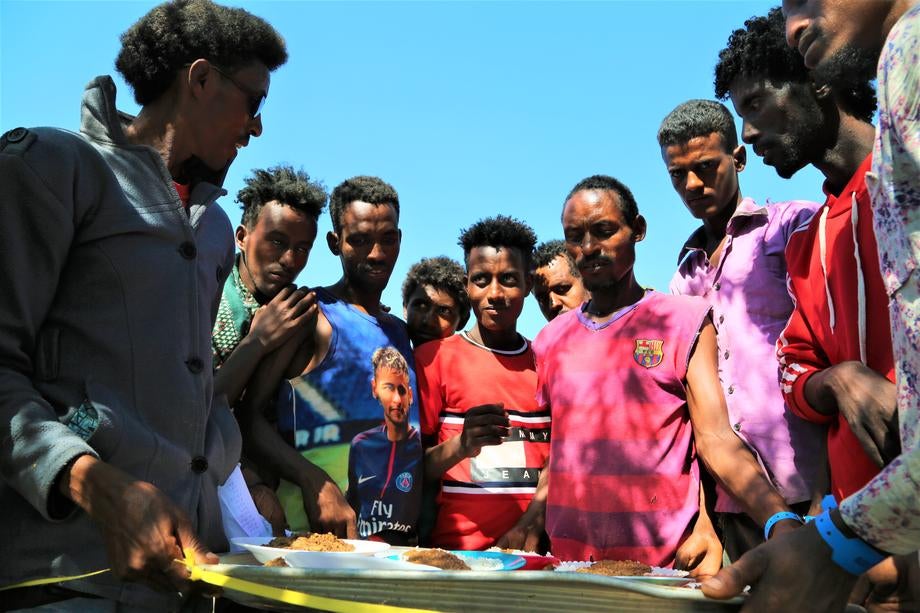Tigray conflict: What is happening in Ethiopia
Fighting has been raging for three weeks, causing hundreds to be killed and thousands forced from their homes as they try to escape the bloodshed in Ethiopia

Your support helps us to tell the story
From reproductive rights to climate change to Big Tech, The Independent is on the ground when the story is developing. Whether it's investigating the financials of Elon Musk's pro-Trump PAC or producing our latest documentary, 'The A Word', which shines a light on the American women fighting for reproductive rights, we know how important it is to parse out the facts from the messaging.
At such a critical moment in US history, we need reporters on the ground. Your donation allows us to keep sending journalists to speak to both sides of the story.
The Independent is trusted by Americans across the entire political spectrum. And unlike many other quality news outlets, we choose not to lock Americans out of our reporting and analysis with paywalls. We believe quality journalism should be available to everyone, paid for by those who can afford it.
Your support makes all the difference.A violent conflict between the government of Ethiopia and military forces in the northern Tigray region has plunged the country into turmoil.
Fighting has been raging for three weeks, killing hundreds of civilians and forcing and thousands from their homes.
The conflict erupted in early November, but has been building for months. Dino Mahtani with the International Crisis Group said “it has been like watching a train crash in slow motion.”
As the country teeters on the brink of civil war The Independent explains the reasons why the violence started, and what impact it’s had on Ethiopians.
What is the Tigray conflict?
Prime minister Abiy Ahmed ordered troops into the region on November 4 after accusing the Tigray People Liberation Front (TPLF) of attacking a military base.
The TPLF denied responsibility for the attack at the camp where federal troops were training.
The outbreak of violence comes after tensions escalated when Mr Abiy became prime minister in 2018.
The TPLF dominated the country for decades until Mr Abiy took power. Tigrayans make up around 5 percent of the population but had outsized influence as the most powerful force in a multi-ethnic ruling coalition from 1991-2018.
Mr Abiy pushed through major government reforms when he became prime minister amid mass anti-government protests.
For example, the dissolution of the country’s ruling coalition, made up of several ethnically based regional parties, and merger of them into a single national organisation called the Prosperity Party.
The Tigray region saw this move as a power grab and an attempt by Mr Abiy to centralise power and weaken Ethiopia’s federal system.
Mr Abiy - who won the Nobel Peace Prize in 2019 for bringing an end to his country’s 20-year conflict with Eritrea - also cancelled elections indefinitely because of Covid-19.
In response, incensed Tigrayan leaders recalled their representatives from the capital and held their own ballot – described as illegal by the federal government.
What has happened in the Tigray conflict so far?
The violence has already caused thousands to flee their homes from the Tigra region into neighbouring Sudan and there has been widespread destruction from aerial bombardment and ground fighting.
The UN has said that 6,000 refugees are entering Sudan every day, with more than 21,000 having crossed since November 20.
The conflict has spread to Eritrea, where the TPLF has fired rockets, and also affected Somalia where Ethiopia has disarmed several hundred Tigrayans in a peacekeeping force fighting al Qaeda-linked militants.
On Thursday (November 26) Mr Abiy green lit the offensive on the regional capital of Mekelle, which is home to 500,000 people.It comes as government gave the Tigray People's Liberation Front (TPLF) 72 hours on Sunday to lay down their arms.
“The last peaceful gate which had remained open for the TPLF clique to walk through has now been firmly closed as a result of the TPLF’s contempt for the people of Ethiopia,” Mr Abiy said in a statement.
Mr Abiy, who won the Nobel peace prize last year for ending a long-running stand-off with Eritrea, called on the people of Mekelle to "disarm, stay at home and stay away from military targets".
What has the international reaction been?
The United States, which regards Ethiopia as an important ally in a turbulent region, has called for peace, saying it supported African Union (AU) mediation efforts "to end this tragic conflict now."
France also expressed concern about the deteriorating humanitarian situation, condemned "ethnic violence" and called for protection of civilians.
Deprose Muchena, Amnesty International’s Director for East and Southern Africa, said on Thursday: “The conflict in the Tigray region has already claimed hundreds of civilian lives, left many more injured, and forced thousands into refugee camps in neighbouring Sudan.
"As Ethiopian federal troops begin preparations to encircle Mekelle, Amnesty International reminds all parties that deliberately attacking civilians and civilian objects is prohibited under international humanitarian law, and constitutes war crimes.
"Indiscriminate and disproportionate attacks are also prohibited.”




Join our commenting forum
Join thought-provoking conversations, follow other Independent readers and see their replies
Comments